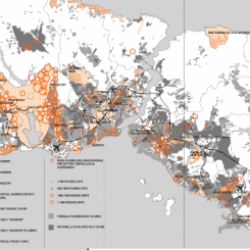
“Those who can’t leave”: urban resistance in Seoul
This video describes the struggle of the population of Yongsan neighborhood (Seoul) against the programmed evictions for the “urban renewal project” for the area, promoted since 2008 by the City administration of the Southcorean metropolis. A protest occupation of a building under construction ended up with the death of five activists. “In South Korea, a country infested by excavators, this could happen to any tenant”. [Entire video in archive.org] In November, the G20 will be held in Seoul.
- “Yongsan widows”. Article and photos about Yongsan, part of the “Places for all” project by Clarisa Diaz: in PDF
- Story of the resistance of Duriban Cafè, cultural center in Hongdae district (Seoul) under threat of demolition. Petition in Japan Indymedia.
- “South Korea: towards an Ubiquitous Mediascape“. Interesting article by the finnish anthropologist J. Joukhi about the uses of technology in South Corea [see also his blog “An anthropologist goes techno“].

